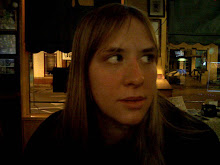
So, the enneagram. Let me begin with a (very) brief overview of how the system works. There are nine basic types, denoted by number. The number system is nominal, meaning they're all created equal, one type isn't better than any other, (one is not greater than three, etc.) Another thing that I didn't mention in class is that every type has a subtype or "wing" - and the wing will always be either lower or higher than your type. Since I'm a type four, I can have either a three wing or a five wing, and this wing helps to temper and further delineate me as a type four. When you take the test, it will also tell you what your wing is (I think.) Further, there are always different levels of health within every type. The healthier we are as people, the more we learn how to take virtues from all the different types to make a more well rounded person. But this is a lot of jargon for you to explore on your own, and I hope you do.
So about me. Like I said, I'm a type 4, and I have a 5 wing. 4w5 is how we present it in ennea-speak. The basic deal with type 4's is that we feel special, sensitive, moody, sectioned off from the rest of society. We are often artists, or in my case, writers. We feel like we need to create art in order to be understood, and we navigate the world chiefly through our emotions. We tend to be narcissistic at worst, and deeply compassionate for others at best. My 5 wing tends to make me more introverted and introspective than if I had a 3 wing. The 3 wing would make me more expressive and extroverted, but alas, no. The goal for any 4 in life is to learn how to get out of our heads, and to be productive in our art. 4's have a tendency to sit around fantasizing about being great artists as opposed to doing the work to actually get them there. When you sit down to analyze your own type, it's good to think about the different strengths and weaknesses that your type has to offer, and identify the ways you can improve. Some of my favorite/famous 4's include, but are not limited to: Thom Yorke of Radiohead, the recently deceased J.D. Salinger, William Shakespeare, Fiona Apple, Bob Dylan, and on and on.
Now, what do I think about all this? Obviously I'm into the enneagram, otherwise I wouldn't have assigned it. I've been studying this system since high school. First my friend David got into it, and then he converted me, and soon all of my friends at school knew what their type was. It tends to really interest some people and seriously annoy others. When I came to Montana I tried to keep the information to myself, but alas, I couldn't keep it contained, and now everyone in the MFA program knows what type they are thanks to me (and also my roommate, a 4w3. She adopted it early on and taught it to everyone else.) The reason I want all of us to learn it is that I just want to give us a collective vocabulary on how to deal with ourselves and others. Further, you may or may not find it useful to know your partner's type when it comes time to interview them for the profile piece. Knowing your own type helps you improve as a person; knowing the types of your friends and family around you will help you relate to them. We often assume that everyone thinks the same as us - the enneagram, or indeed any personality type system helps us appreciate each other's differences. I look forward to reading all about your results.
Again, I'd like these posted by Sunday at midnight. Any earlier postings would be greatly appreciated as I'm really looking forward to reading these!
go here. click on the first link, enneagram personality tests > under the "ennagram tests" header, click on "advanced test" - email yourself the results page.
Once you get your test results, you can read bulleted information about the different types here to determine if you think the test is right.
Wikipedia isn't always a great source, but for the kind of pop psychology we're dealing with here, its got decent information that I trust.
Please do further research on your own for different sources. There are also books on the subject. The big authors in Enneagram land are Helen Palmer and Don Richard Riso. Good luck, friends.
